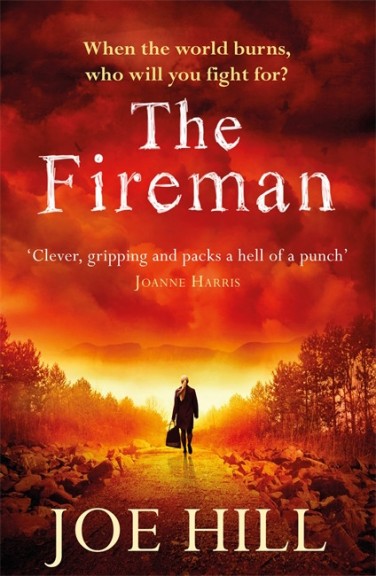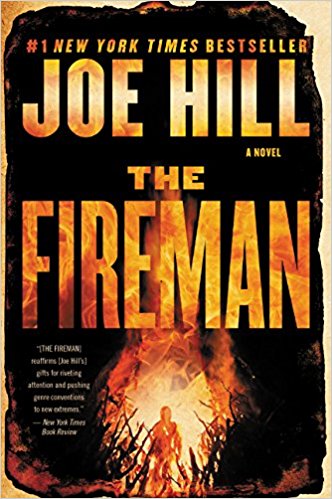Novel * Joe Hill * Fire Plague! * 2016
Synopsis
I really, really, really wanted to like this more than I did. I mean, just look at the premise here: a new plague called Dragonscale is proliferating and sweeping across the country and beyond. It’s a fungal spore which colonizes human hosts, leaving sick tattoo-looking golden swirls and patterns on the skin. Then they spontaneously combust! So not only do you have the normal issues with a pandemic plague situation, you’ve also got random giant firestorms popping off and burning down cities and forests. That’s an intriguing setup already, but then you realize that it’s Joe Hill playing in his father’s sandbox and you’ve got the promise of an alternate-world version of The Stand, and that’s rad. I mean, there are characters straight-up taken from that novel, although to be fair they’ve been adapted to the point where it’s a clear nod of respect to the father’s landmark book as opposed to like Flagg showing up. Anyway, all that on the surface sounds cool as heck and here we are, over two months after I started the book, and I just don’t know. It’s fine, I guess.
There are a few issues I’m trying to parse here, so bear with me. The Fireman is a situation where the book is clearly and cleanly written. The narrative moves. The characters are, for the most part, strong, if a little broad. The protagonist, Harper Willowes, is fantastic. I know I’m going to get into a litany of things I don’t care for, but it’s all going to sound so petty. I guess here’s the main problem I have with the novel. It’s 750 pages long, and while those pages move at a pretty good clip if you’re invested in the scene that’s happening, it can be a daunting thing to come back to. It’s strange. I would pick the book up when I had an hour or so, and just blast through whatever section I was reading. As I said, Hill’s style is clean and quick. But then I’d put the book down and not want to pick it back up. To be totally fair, some of that is on me and my mercurialness. I don’t always feel like reading; sometimes I just want to zip around Forza Horizon 4 and listen to rambling podcasts about R.E.M. Yet The Fireman wasn’t a particularly strong lure. I think that the crucial issue is that for all its length, it doesn’t really go anywhere for long stretches.
For obvious reasons, The Fireman naturally lends itself to being compared to The Stand. And Joe Hill can’t even be mad about it because he went out of his way to ensure those comparisons would happen. There’s a deaf character named Nick and a misogynistic piece of shit named Harold so the books are linked even before you get to the plot. The key difference between the novels is that of scale (heh). The Stand is a massive epic that follows a multitude of various characters across a continent. It’s expansive, but it also never sits still. Someone is always going somewhere and when the end comes it’s a spectacle. The Fireman, on the other hand, stays in one place for the most part. There are still a multitude of characters, but in the end only a few of them really seem to matter much. Now, it’s possible to have an epic-length novel in which the setting is a small town (Joe Hill’s old man managed such a thing with It), but this particular story just felt long for length’s sake, and the entire thing reads like an author too in love with his own plot to make any serious attempt at editing. Okay, now to get a touch more specific.

I’m a sucker for a good “lone hero walks into the flaming apocalypse” shot.
Discussion
I know I’m kind of all over the place with this book, but it’s only going to get worse. As I mentioned, I like the protagonist a lot. Harper is a delight, a generally positive person who is a nurse because she legitimately wants to help other people. She also has a toughness about her that is understated. Look, I’m a sucker for a strong female lead. Give me a sassy woman with a shotgun and a filthy mouth and I’m all in. Harper is not that. Nurse Willowes is way into Mary Poppins and singing silly songs and is not trying to emulate Sarah Connor. She spends pretty much the entirety of the novel pregnant, which considering the shit she goes through, whew. Haper’s toughness is apparent when she is enduring things she doesn’t need to in order to protect those she loves. There are no action-hero antics with her, just a commitment to being a good person no matter how awful things get around her. That said, she’s not some insufferable, saccharine perfect pretty princess either. She swears and she fucks, so that’s all right. Harper can be too submissive at times, though, too ready to fade into the background, too ready to trust untrustworthy people. Insofar as character flaws go, those are pretty mild and if there’s a criticism to be made it’s that Harper’s a little too good-guy pure to feel entirely realistic.
Of course, having a Light Side protagonist and an obvious Dark Side antagonist is another thing The Fireman has in common with The Stand. It’s just that here the stakes are much lower because the scale is smaller. Instead of Randal Flagg, who is chaotic evil incarnate, you’ve got Jakob, who’s just a dude. I mean don’t get me wrong, Harper’s ex-husband fucking sucks, but he’s not a dimension-hopping being of pure malice, you know? And that’s one of the problems, I think. Not that I need Jakob to be a literal demon or anything. Flagg is Flagg, and belongs in an epic. However, the problem with Jakob (and to a lesser extent, Harper) is that they’re still positioned in this black and white, good versus evil situation, and that doesn’t seem to be what Hill’s going for with The Fireman. If this is to be a smaller-scale, character-based story of people coping with an apocalyptic situation, then the characters need to be fleshed out accordingly. Jakob isn’t that. At first he’s just a shitty undercover misogynist who is also a low-key racist. He infantilizes Harper because he sucks. Yet before we get much else out of him (beyond being an insufferable, pretentious, douchebag), Harper gets infected and Jakob just goes Full Psycho. After the first fifty pages or so, Jakob is just a dark force of doom and evil and we see more of his tricked out snowplow than we do of him.
It’s lucky, then, that the more interesting character dynamics happen within Camp Wyndham. The titular Fireman, John Rookwood, is super fun and appropriately layered. Father Storey and his family are all more fleshed out than any of the baddies, but I don’t know. In retrospect it all seems kind of obvious. Carol Storey is going to be the evil cult leader. There was always going to be betrayal. There was always going to be an apocalyptic scene of slaughter. Now that I think about it, and this checks out considering Joe Hill’s history, these characters are rather broad in nature. They’d be a better fit in a comic book format, where that kind of characterization is better suited (side note: this is not a knock against graphic novels, it’s just that in a visual medium broader characters fit better since it’s hard to illustrate subtle character traits). At this point, then, it seems like the plot is the priority, which is strange considering the small scale of the setting. And here’s where my main issue arises: it’s clear that Hill was besotted with his own plot, and that drove me crazy.
Look, sometimes you need to foreshadow. It’s a way to keep your reader engaged with a scene that might otherwise seem insignificant. In my professional opinion, the technique should be used relatively sparingly. You can only drop an end-of-chapter sentence like “and she never saw him again” maybe once or twice a book and have it be effective. This motherfucker uses sentences like that constantly. By the end it got to the point where I was imagining the author sitting behind me giggling and rubbing his hands together before leaning over and whispering “and just wait for what happens next, it’ll blow your mind, bro” as I’m reading. I think there was a point where, mid-description, the author leans in and straight up tells the reader to “remember that stone.” Fuck you! I get it, you like writing action scenes. It wouldn’t have been so noticeable if the entire book was written in that kind of loose tone and style, but for the most part it’s a straight narrative. And then you get to the end, which pretty much happens a hundred pages before the actual end, and I don’t know. It’s hard to recommend. NOS4A2 was dope, though.
